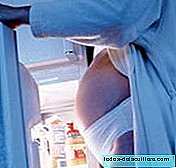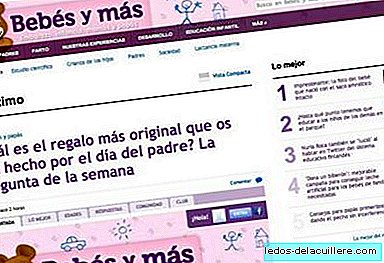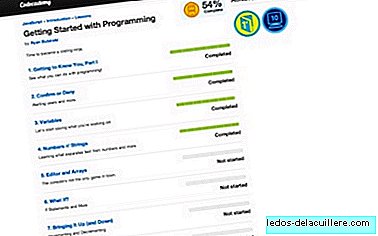
While they are breastfeeding, children's stools are soft and there is usually no problem when it comes to having a bowel movement. It doesn't matter if they don't poop for one or more days, because it's not about constipation and it doesn't affect the baby. We understand by constipation the occasional evacuation of feces that involve an important effort and pain to the baby.
This usually happens after six months, when we introduce complementary feeding. And even if they can't tell us about it themselves, we see that when it comes to pooping, babies cry and visibly complain, they turn red from the effort for a long time ... Sometimes stools may also appear with a little blood if It has produced some small tear of the intestinal mucosa when evacuating.
If the stool is too hard, the child suffers while trying to evacuate. The same happens if the outflow of the intestine is irritated or there is a small tear: the baby hurts, retains the feces, they harden and thus enters a vicious circle. Evacuations of this type can be daily or lengthen more over time.
Why is the baby constipated?
The next question is, why is my baby constipated? All the little ones make the transition from exclusive breastfeeding to complementary feeding and many of them suffer from constipation with this important novelty. This is because the stomach and digestive system have to adapt to new foods and there is a transition.
During this period, therefore, bowel movements may slow down due to solids, to new eating habits. It is better to maintain breastfeeding for the first six months and introduce complementary feeding after and not before, since the baby's digestive system is more immature to "assume" novelties.

Constipation before six months: when to worry
As much as parents worry us, it's not about constipation before six months If the breastfed baby does not poop every day (and even passes several days without having a bowel movement) while the stool is soft and the baby is not uncomfortable. Newborns fed with breastfeeding tend to have firmer and less frequent bowel movements.
But before six months there may be other causes if the baby does not evacuate or does so minimally, although they are less common. Therefore, if the baby has defecation problems that persist from birth, a medical diagnosis and even surgical intervention are required.
Fetal intestinal atresia is a malformation in which a part of the intestines of the fetus are damaged or not formed properly. Then there is an obstruction or blockage that prevents the normal passage of liquids or food.
Fetal gastrointestinal atresias can occur anywhere in the digestive tract, from the esophagus to the anus. They usually manifest in the first week of life.
A less frequent organic cause of the baby being constipated is that a narrowing of the intestine has occurred. It would be a intestinal stenosis caused by abnormal thickening of the mucosa. Nor is it normally related to the introduction of complementary feeding.
The latter cases of constipation are severe and need medical attention and intervention from the pediatric gastroenterologist surgeon to see the extent of the disorder and the necessary surgical treatment and operation.

What to do if the baby is constipated?
Let's see below how to act if the baby is constipated after six months due to the introduction of new foods. But first, we will say what not to do. This is resorting to the use of laxatives, enemas or introducing an object in the anus (swabs with petroleum jelly or oil ...) to try to "help" out the baby's poop, practices advised against by dangerous.
Artificial laxatives are not recommended in babies. We must look for foods rich in fiber and adequate hydration.
Basically we will try to increase the water supply, starting by offering more breastfeeding to the baby (it starts to be more thirsty) and even a little more water. Remember that the basis of feeding a baby until the year is still milk, which until two years is still very important in your diet.
Fiber is important for intestinal functioning, so that once we verify that the baby is accepting food well, we must offer them fruits, vegetables and vegetables. A diet rich in these foods will help fight constipation. Instead of banana or apple, which are astringent fruits, you can increase the consumption of plums, kiwis, oranges, carrots ...
Can be used whole grains (in the porridge, bread, cookies ...) since these have a greater contribution of fiber.
Circular massages in the baby's belly for a few minutes may favor bowel movement. We can choose the relaxing moment of the bath or any other time when you are willing to receive an abdominal massage.
If we observe that the baby tries to poop, we can help him by gently lying on his back and flexing his legs on the triplet, pressing lightly, as is usually done to expel the gases. If we remove the diaper and perform this maneuver, the posture may encourage you to push to evacuate.
Probiotics have been shown to be effective in treating constipated babies, since these "good" bacteria balance bacterial populations in the intestines.
Finally, remember that constipation can come with the first porridge or with a change of diet, or later with stressful situations for the child (because he changes his house, school starts, parents separate ...).
Stay tuned for baby's bowel movements and We hope that through these tips the constipation of the baby from six months will be less common, so that the little one is happier and healthier and the parents are calmer ...
Photos | Thinkstock
In Babies and more | What do you do if my child is constipated? First baby porridge and constipation, What is baby poop like and what are the related warning signs












